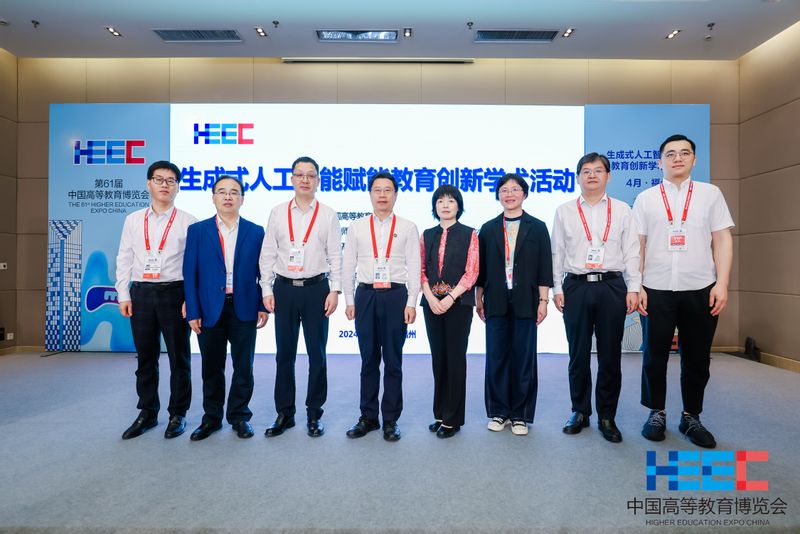The academic event on educational reform empowered by generative artificial intelligence was held on April 16 at Fuzhou Strait International Conference and Exhibition Center. This event was sponsored by China Association of Higher Education and co-organized by College of Education of FNU, Research Association of Learning Sciences, CAHE, China Higher Education Training Center, and Reed Sinopharm Exhibition. The opening ceremony was attended and addressed by Zhao Xianfeng, Chairman of Research Association of Learning Sciences, CAHE and Party Secretary of Yanshan University, Wang Xiaomei, Deputy Secretary-General of the 7th Council of China Association of Higher Education and Editor-in-Chief of China Higher Education Research, and Liu Sannuya, Vice President of FNU, Dean of Faculty of Artificial Intelligence in Education of Central China Normal University, and Executive Deputy Director of National Engineering Research Center of Educational Big Data. Chen Li, former Vice President of Beijing Normal University and Vice President of China Association for Educational Technology, and Wang Dianlong, Vice President of Yanshan University, along with over 100 experts and scholars from various universities in China attending the conference.
At the opening ceremony, Zhao Xianfeng stressed the important role played by Research Association of Learning Sciences, CAHE, an important academic branch under China Association of Higher Education, in persistent studies of the key elements that impact the reform and development of the education sector, in alignment with national major strategies and economic and social development needs. The field of educational intelligence have seen numerous experts conducting systematic and in-depth research, yielding a number of representative achievements. And this seminar is a perfect occasion for sharing and showcasing the research outcomes that have been achieved so far. He hoped that through this academic event, valuable insights will be provided to better advance the optimization and upgrading of China's new era educational governance system and the reform and innovation of educational teaching models.
Wang Xiaomei emphasized that the current era is being reshaped by technological forces at an unprecedented pace. Adapting to the changes of the times, mastering and applying new technologies, new science, and new paradigms in the field of education is not only an important mission of scientific research but also an inevitable requirement to implement the strategic deployment of building a learning society and a learning-oriented country where lifelong learning is embraced by all as outlined in the 20th National Congress of the Communist Party of China. She pointed out that Generative Artificial Intelligence, as a representative frontier technology, will bring infinite possibilities for exploring future educational innovations in aspects such as the supply of educational resources, transformation of teaching models, and the ecological system of lifelong learning in the education sector.
Liu Sannuya introduced the basic condition of the school and its recent achievements in education. He emphasized that higher education, based on undergraduate education while expanding and strengthening graduate education, carries the responsibility of nurturing talent with creative thinking and innovative abilities. He hopes that all the experts can take this opportunity to further build consensus, wisdom, and strengths, collectively contributing to the coordinated development of education, technology and talent.
In the keynote session, Chen Li, Zheng Yanlin, Party Secretary of School of Information Science and Technology of Northeast Normal University, Yi Baolin, Vice Dean of Shenzhen Research Institute of Central China Normal University, Yang Ning, Professor at the School of Education at Fujian Normal University, Gu Xiaoqing, Director of Department of Education Information Technology at East China Normal University, Li Yan, Vice Dean of College of Education Zhejiang University, and Yang Qifan, Associate Professor of School of Education of Fujian Normal University, delivered keynote speeches titled respectively ''Challenges and Strategies in Education in the Era of Artificial Intelligence,'' ''Empowering Education with Generative Artificial Intelligence: How to Enable,'' ''Driving Educational Digital Transformation with Digital Driving,'' ''Paradigms and Potentials of Integrating Generative Artificial Intelligence into Subject Teaching,'' ''Enhancing Learning through Digital Driving,'' ''Insights from Several Empirical Studies on the Application of Generative Artificial Intelligence in Education,'' and ''Innovation and Transformation of Teaching Methods Led by Artificial Intelligence''. The presentations focused on exploring innovation and high-quality development in higher education under the background of generative artificial intelligence, fostering exchanges and discussions.
During the closing ceremony, Liu Sannuya emphasized in his summary that generative artificial intelligence is the most revolutionary technological breakthrough in recent years, which plays a driving role in the formation and development of new productive forces for the country, society, and various industries. He expressed the hope that experts and scholars at the conference would showcase a panoramic view of artificial intelligence from different perspectives such as guiding principles, empirical research, model technology, teaching innovation, and teacher growth.

